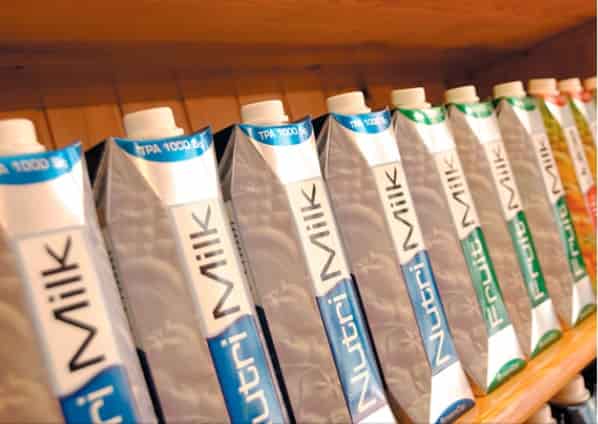Tetra Pak package thin layer polymer plastic prevent moisture - Arhive
Bio-based polymers
In 2011, we launched the industry’s first caps made from bio-based polymers. Derived from Brazilian sugar cane ethanol, they look exactly the same as conventional caps but have a significantly lower carbon footprint. Where bio-based caps are available, customers can easily switch without additional investment or modifications to filling machines. Recyclability is not impacted, as the new materials are processed together with conventional polymers without restrictions. We can now offer bio-based caps for all advanced packaging formats.
By 2014, we had created the world’s first fully renewable package for liquid food, the Tetra Rex® Bio-Based, made with bio-based cap, neck and film. By the end of 2016, we had delivered over 100 million of these renewable packages to meet customer demand. In the same year, we also launched the Tetra Brik® Aseptic 1000 Edge with Bio-based LightCap™ 30. It is the first aseptic package to have a film and cap made from sugar cane-based plastic. Combined with the paperboard, this lifts the share of materials from renewable sources in the package to above 80 percent, the threshold for four-star certification from Vinçotte.
‘OK Biobased’ certification
As environmental awareness among consumers increases, independent verification of the renewability of raw materials is increasingly important. The ‘OK Biobased’ certification shows consumers how renewable a product really is. The scheme, run by Vinçotte, uses rigorous scientific processes and methodologies to rate the percentage of bio-based raw materials, with four stars showing over 80 percent is from bio-based materials.
Challenges and opportunities
Despite considerable progress, bio-based polymers are still only in a small fraction of our cartons and a niche product for the plastics industry. Our commitment remains to expand their use to cover more of our packages, across all sizes. The challenge becomes increasingly complex when considering the social cost of alternative raw material sources (e.g. local food availability and working conditions) attached to bio-based polymers.
We are working with a number of our stakeholder partners to explore these issues, while also continuing to assess alternatives like other plant-based materials, organic waste and algae. For example, we have formed an agreement with Braskem, the largest thermoplastic resin producer in the Americas and are now using low-density polyethylene derived from sugar cane for coatings in all our packages produced in Brazil. A Code of Conduct including social and environmental criteria guides Braskem’s sourcing and is part of our agreement.
Related Topics

 A Tetra Pak package has a thin layer of polymer, or plastic, to prevent moisture getting in or out and to keep contents fresh. It is also in our caps, closures and straws. Our long-term ambition is for all our chilled and ambient packages to be made from renewable alternatives to oil-based plastics.
A Tetra Pak package has a thin layer of polymer, or plastic, to prevent moisture getting in or out and to keep contents fresh. It is also in our caps, closures and straws. Our long-term ambition is for all our chilled and ambient packages to be made from renewable alternatives to oil-based plastics.